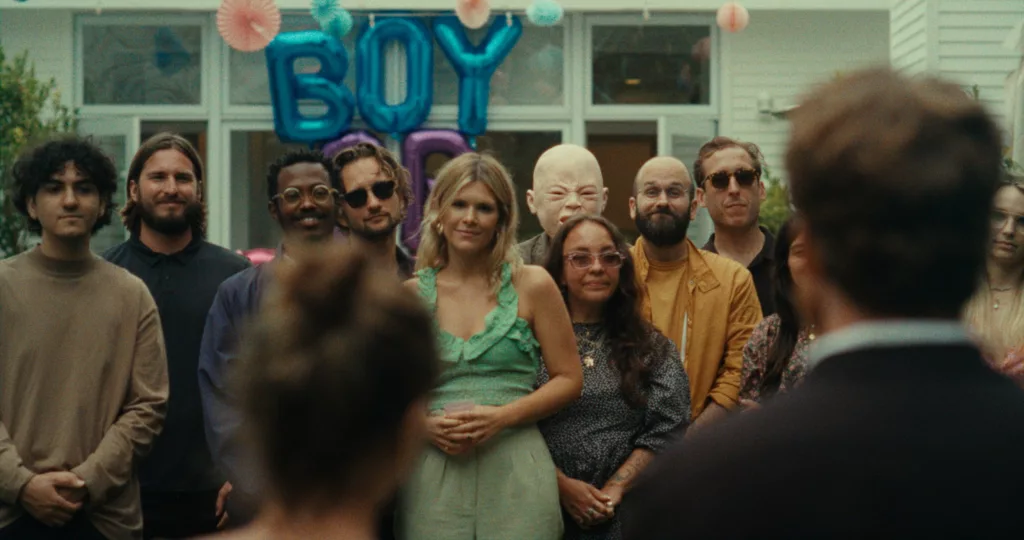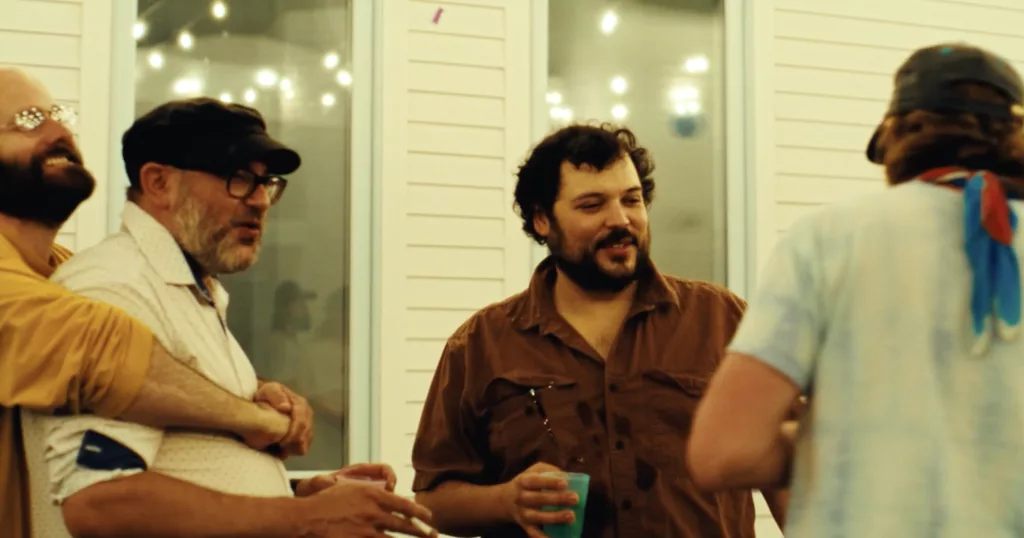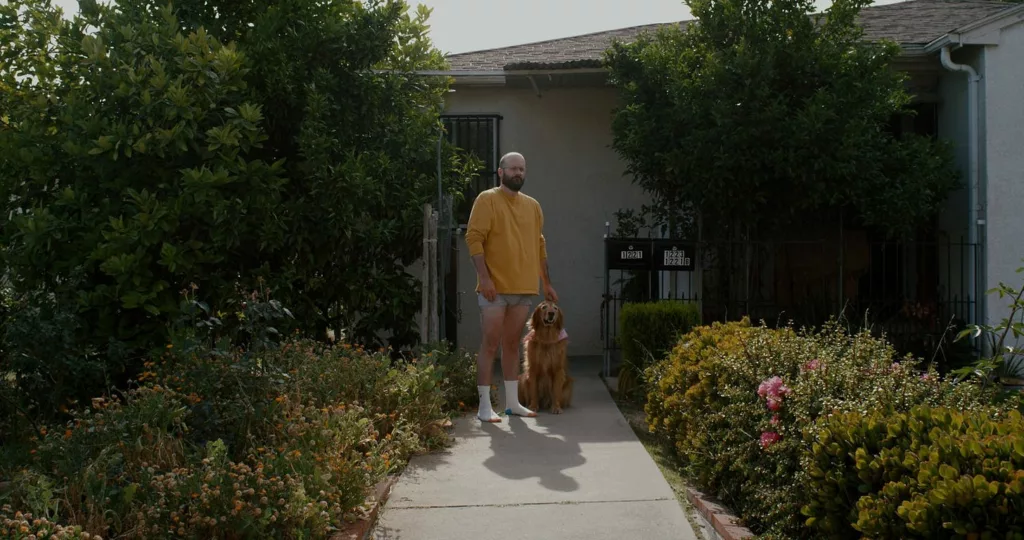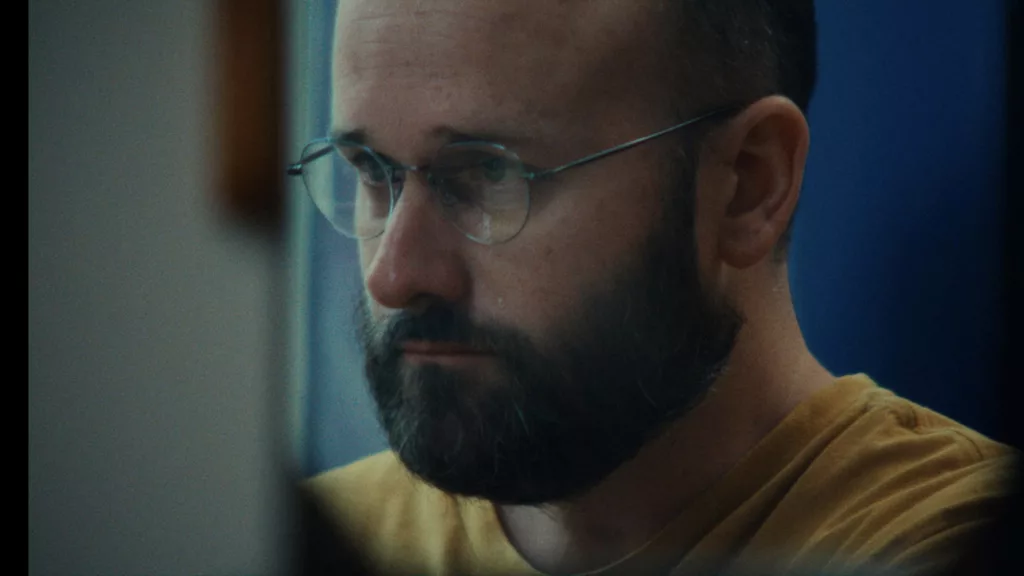Have you ever had one of those days where everything that could go wrong does go wrong? Where do you feel like the whole world is conspiring against you and you’re utterly powerless to stop the slide into madness? That’s the experience writer-director Al Warren sets out to capture in his 2023 indie comedy, Dogleg.
We’re introduced to Alan, a filmmaker who’s been working on his passion project for five long years. Just as he’s preparing for an important shoot, Alan finds himself tasked with dog-sitting his fiancée’s pampered pooch, Roo. But distracted by a friend’s gender reveal party, Alan loses track of Roo and so begins a hapless search through the streets of LA.
To compound Alan’s troubles, the shoot devolves into total chaos. Nothing goes according to plan, and Alan’s tenuous grip on sanity starts to slip. Intercut throughout are snippets from Alan’s experimental “film within a film,” capturing portraits of eccentric characters around the city.
With its nonlinear jumps between comedic vignettes, Dogleg may seem a far cry from traditional Hollywood fare. But Warren’s unconventional style is very much by design. He draws on theories of “transcendental cinema,” which embrace ambiguity over clear answers. By blurring reality with Alan’s art, the viewer shares in his disorientation and loss of control.
Beyond its narrative fun, Dogleg offers poignant commentary on the creative process. After pouring years into his labor of love, Alan comes face-to-face with its unpredictable nature. Much like the plot itself, his film takes on a life of its own, refusing to bend to anyone’s will. By relinquishing and striving for certainty, Alan manages to find his footing—and his dog—again.
Part slapstick comedy, part love letter to struggling artists, Dogleg is an unconventional delight that will speak to any dreamer who’s faced the chaos of creation. Through warmth and humor, it finds profound truth in our shared humanity.
Following the Chaos: Dogleg’s Story and Characters
After losing his fiancée Julia’s dog, Roo, at a party, the day goes from bad to worse for Alan. As a director who’s poured five years into his film, he’s feeling the pressure. Not only does he need to find Roo fast, but he also has an important shoot scheduled that evening.
Alan’s not a big-time Hollywood player, though. His film is a low-budget, experimental project shot over the years in bits and pieces. Like his day unfolding in Dogleg, Alan’s struggled to control his creation. With the clock ticking, he sets off on a mad search through LA, hoping sheer determination can wrangle everything back on track.
Right away, Alan bumps into an array of eccentric characters. There’s the party host who kicked off this mess by letting Roo loose. A mysterious stranger temporarily lends Alan an electric board, only for it to get swiped. Passing strangers proves both helpful and hindering.
As Alan dashes between leads, his anxiety rises. A call with his tough-love dad doesn’t help, questioning if he’s really cut out for this filmmaker dream. His loving fiancée, Julia, adds pressure as his anchor and biggest fan.
When Alan finally makes it to his shoot, chaos reigns there too. Nothing goes according to his fragile plan. As the pressure mounts, cracks start to show in Alan’s normally easygoing demeanor.
Through it all, viewers see glimpses of Alan’s experimental film project too. Short portraits captured along LA streets hint at his creative vision and voice. But even his art feels beyond his control as the day spirals further out of hand.
Dogleg traces one man’s mad scramble through a city that refuses to cooperate. Through its quirky characters and freeflowing narrative, the film invites us into Alan’s experience of life as a mess beyond any single person’s power. With humor and humility, it captures the messy realities of creation and control.
Freeflowing Form: Dogleg’s Unconventional Structure
Dogleg takes an unconventional approach to storytelling that shapes how we reflect on its world. Rather than follow a straightforward narrative, the film weaves together short films and moments from Alan’s chaotic day.
Through this structure, writer-director Al Warren invites us to rethink how stories are constructed. The fragments don’t neatly click into place, much like how life’s events often feel disconnected. We glimpse Alan’s experimental film project too, seeing how reality challenges artistic control.
This style aligns with Paul Schrader’s idea of transcendental cinema. By stripping away expectations, films can access deeper truths about existence. By omitting conventions, Dogleg stylizes reality in a way that’s oddly calming.
Without moments building to predictable conclusions, our minds are free to drift in the scenes. We sit with characters in real time, amid life’s strange detours and diversions. The rhythm slows at times too, trusting viewers can find meaning in stillness.
There’s a meditative feel as stories connect and disconnect. We join Alan, not knowing what each encounter will offer or how the day might piece together. Surrendering to this flow mirrors the lack of control in our own unpredictable worlds.
By breaking norms, Dogleg subverts notions of tidy storytelling and representation. Its flow is like the improvised nature of living—parts don’t add up yet reveal interconnectedness when we open our perspectives.
Through uncertain moments, Warren’s film cultivates stillness and wonder about reality’s puzzles beyond surface reason. Its freeform style quiets preconceptions and stays true to the messiness of creation that can’t be corralled or understood.
Ultimately, Dogleg’s unconventional structure exemplifies how the transcendental embraces life’s unknowability. Its refreshing form is an invitation to mindfully see beyond what’s on the page or screen.
Unstable Ground: When Creativity Exceeds Control
One theme at the heart of Dogleg is the fleeting nature of control. We see this play out through Alan’s chaotic day as he struggles to find his dog Roo and complete a film shoot.
Alan clings desperately to any sense of order, yet the day continues spiraling. No matter his efforts, forces beyond understanding seem determined to unsettle each plan. When the gender reveal startles Roo from view, Alan’s troubles have just begun.
His scramble through the streets captures a day when life refuses cooperation. No lead or call eases Alan’s turmoil, putting our own stability in perspective. How often do our ordered schedules get waylaid by unexpected disturbances?
Warren draws parallels to the creative process. Just as Alan pours years into a film that grows beyond any script, art often develops an agency outside our hands. Inspiration arises when least expected, and progress stalls without reason.
Yet the challenges facing indie filmmakers like Warren also inspire. Despite obstacles that would frustrate others, his perseverance saw Dogleg through to completion. Though control remained fleeting, belief in a vision can move mountains.
As Alan nears breaking, we share his fight to salvage order. But through it, the film suggests finding purpose beyond stability alone. Perhaps creativity thrives best when embraced, as unbound as the surprises of each new day.
When has your own ground felt least sure? With empathy, Dogleg reminds us that solid plans have room for serendipity too. And whatever life brings, opportunities for connection often emerge amid the unsteady parts.
Drawing from Life: How Dogleg’s Cast Grounds its Quirks
Under its clever capers, Dogleg resonates through genuine bonds between the cast. Warren stocks the film with talents finding nuance even in absurdity, lending inviting warmth to quirky characters.
Their friction feels authentic because it stems from knowing each other’s rhythms. Scenes like the staring contest lose weirdness through comfort as performers play off spontaneous reactions. Although strange, the moment stays anchored through familiar understanding between the actors.
This grounds other surreal sequences. When a scooter stranger gets swept into oddity, the cast’s touch lends an invitation to smile rather than recoil. Their ease guides viewers past potential discomfort, seeing humor where logic might not.
Even tension flows naturally. As Alan’s meltdown unfolds, castmates trade barbs in a way that feels sympathetic rather than cutting. We share a bond strong enough to weather impatience through a hard day.
Their portrayals feel winningly real, partly through tapping shared history. Just as the crew sustained a long production, the cast translated this persistence into characters facing frustrations together.
When Alan’s control slips, others understand rather than criticize, as collaborators do when creativity exceeds plans. This humanity is Warren’s most subversive stroke, smuggling resonant truths into quirky packages.
So while plots wander and technology fails, anchoring in emotional authenticity keeps the film inviting. Its players bring a lived-in warmth that, even when absurdism emerges, feels invitingly familiar.
In recreating collaborative ups and downs, Dogleg underscores how lasting bonds sustain work through the challenges of the craft. And how sharing this journey can make the peculiar profoundly human.
Breaking Free from Tradition: How Al Warren’s Dogleg Revitalized Independent Cinema
Al Warren’s unconventional dogleg clearly resonated once it hit screens in 2023. Critics hailed the film’s refreshingly loose style, which swapped strict plots for vibrant moments. Audiences, too, embraced its quirky charm, building a devoted following as a cult favorite.
Right away, reviews drew praise for how Warren’s direction breathed new life into worn formulas. Rather than neat resolutions, viewers enjoyed diving headlong into the film’s anything-goes spirit. As characters slipped control’s grip, so did the story, keeping people engaged through unpredictable scenes.
Warren’s DIY tour also proved a success, cultivating devoted local fans eager to join his unconventional experience. Interactive screenings transcended passive watching, becoming vibrant community events. This intimate approach fostered lasting appreciation, giving the little film real momentum.
In the years since, Al Warren has continued to reimagine traditional boundaries with each new project. Yet it was the unforgettable Dogleg that truly set him apart, establishing his signature style of playfully subverting expectations.
Today, the film’s influence lives on in newer artists who are also pursuing personal visions outside of rigidity. In redefining what stories can be, Warren inspired many to trust creativity’s untamed spirit over prescribed structures.
So while other filmmakers stick to formulas, Al Warren and Dogleg showed that sheer originality and rule-breaking can yield rewarding results. Their legacy reminds us that cinema’s future lies not in repetition but in rule-breakers willing to break new ground.
Choices and Consequences: The Lessons of Dogleg
Dogleg takes viewers on quite a journey through its unconventional structure. Rather than a traditional narrative, it offers interwoven stories that build a greater whole. Though Alan seeks order in his day, unpredictable events intervene. Still, he adapts amid life’s uncontrollable turns.
This reflects how creative work often evolves differently than planned. Warren found new inspiration when faced with challenges. His ability to react strengthened Dogleg into the quirky hit it became. Flexibility proved vital, just as Alan improvised through unexpected problems.
Underneath amusing absurdity lies meaningful commentary. By relinquishing control, Alan—and we viewers—learn acceptance. While creativity demands vision, its fulfillment depends on accepting forces beyond our control. Through both comedy and sincerity, Dogleg’s humanity resonates universally.
It reminds us that despite plans going awry, joy can emerge from openness to life’s surprises. By riding waves instead of resisting them, we gain new insights and outcomes we could never have envisioned alone. In trusting relationships and chance encounters, solace exists during uncertainty.
Ultimately, Dogleg is a reminder to embrace unpredictability with compassion. Its thoughtful yet spirited approach leaves lasting inspiration for anyone pursuing their creative calling or simply navigating life’s surprises. Through genuine feeling and humor, Warren’s debut film astutely captures what it means to be human.
The Review
Dogleg
With Dogleg, Al Warren has crafted an ingenious and heartfelt debut that deserves appreciation. Executed with improvisational flair, its unconventional structure lends an authenticity missing from polished Hollywood fare. Viewers are treated to quirky relatability as well as thought-provoking lessons about life's unknowable nature. After following meandering paths, Dogleg arrives at uplifting truths about flexibility and human fellowship. It leaves audiences entertained and inspired in equal measure.
PROS
- Unique and unconventional structure
- Improvised-style dialogue feels authentic
- Engaging directorial debut for Al Warren
- Skillful mix of comedy and introspection
- Warm and humane characterizations
- Uplifting message about embracing uncertainty
CONS
- May confuse or lose some with the nonlinear format
- An open-ended narrative won't satisfy all viewers
- Improv style could seem unpolished to critics
- A quirky tone won't appeal to all audiences






















































Discussion about this post